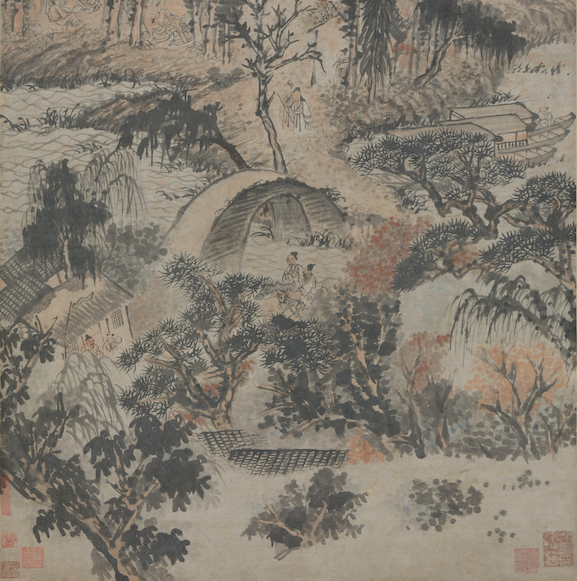
Autumn Wellness
Autumn is a time of gathering and harvesting. Animals run around collecting food, and plants collect and condense nutrients into seeds. Yang qi was rising and flourishing in spring and summer–vaporizing the yin water in the environment to create moisture, and now it retreats inward into “storage mode,” resulting in cooler and dryer conditions. Yang begins to give way to yin. Autumn corresponds to the Metal phase (jin 金) and the lungs.
As a result, we want to focus on diet and lifestyle habits that promote moistening, support the lungs, and nourish yin. Sour tasting foods astringe and nourish the lungs, while pungent tasting foods disperse and purge. It’s best to eat less spicy, cold, or raw foods and rather eat more sour foods as well as moistening foods including soups and stews. Although the lungs have an affinity to pungent flavors, it is best to look at the greater context and note that lungs are abundant with qi and metal can have an overbearing action on wood. Wood is associated with liver and sour tasting foods, therefore rather than eating too many pungent foods in autumn it is best to eat more sour tasting foods which will nourish and protect the liver qi. Matching the color associated with the Metal phase, we can eat more white-colored foods, many of which are excellent for balancing the dryness of autumn.
In the second chapter of the Huangdi Neijing, titled “The Law of Regulating Spirit in the Four Seasons” 《黄帝内经四气调神大论》it says:
“Go to bed early and get up with the chickens [at dawn]. This will cause all mental faculties to become calm and peaceful, and moderate the downward blow of autumn. Reel in your mental energy to be in harmony with the condensing quality of autumn qi. Do not disperse your energies, and the lung qi will be clear. This is the way of nourishing life in accordance with the nourishing and constricting qi of the autumnal harvest season. Going against these principles will harm the lung network, eventually causing diarrhea in winter, when things should really be in a state of storage rather than leakage. The qi of Autumn is dry, and so it is advisable to consume some moistening sesame to counteract the dryness. Avoid cold drinks, and do not wear damp and cold clothing close to your skin.” 1
It’s best to start going to bed earlier in the Autumn and make sure we are getting enough sleep. Like spring, autumn is a season of change therefore a time when diseases are prone to surface. It is best not to drain one’s energy and take special care to strengthen the immune system. We should be sure to also get adequate exercise, but not to overdo it. It’s best to cultivate a calm and peaceful attitude in Autumn, letting go of any worries, seeking a state of quiet harmony, and matching the increasingly calm atmosphere of nature.
Correspondences
Yin (Zang) Organ: Lungs
Yang (Fu) Organ: Large Intestine
Direction: West
Color: White
Flavor: Pungent (Acrid)
Climate: Dryness
Orientation: Inward
Sense Organ: Nose
Tissue: Skin
Positive Emotion: Righteousness (yi 义)
Negative Emotion: Grief (ku 苦)

Recommended Foods
| Vegetables | Fruit |
| Chinese yam (shan yao 山药) Lotus root Cauliflower Snow Fungus (Yin’er 银耳) Radish Onion Parsnip Fennel Leek Shiitake mushrooms Bean sprouts Celery Chinese cabbage Water chestnut Brussel sprout Sweet potato Pumpkin Lily flower | Pear Apple Grapefruit Fig Peach Guava Pineapple Hawthorn Grapes Tangerine Persimmon |
| Protein | Carbohydrates |
| Silken tofu Duck Duck egg Fish Crab Sesame Chicken Black bean | Glutinous rice Red rice Oat |
| Other | Eat Less |
| Honey Chestnuts Tahini Rice wine Extra virgin olive oil | Dry baked goods Chips Crackers Fried and roasted foods Spicy food Cold or raw foods |

